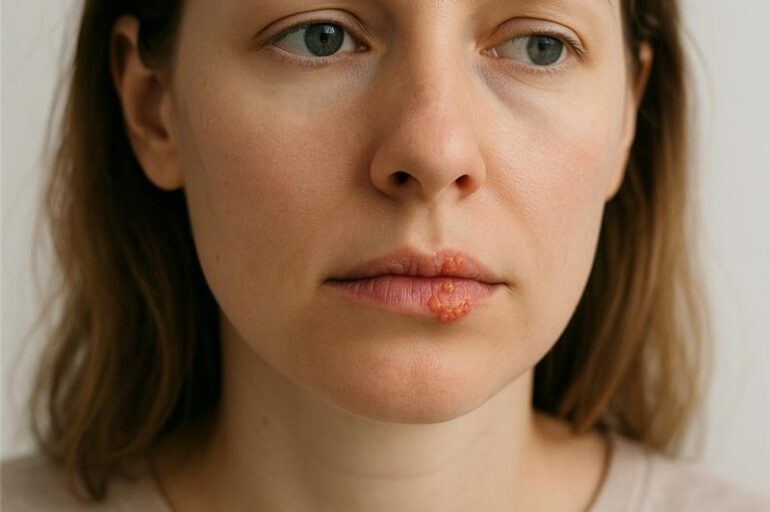Herpes is a common viral infection that affects millions of people around the world.
While it’s often associated with cold sores or genital herpes, there are actually several types—each with its own characteristics, latency cycles, and modes of transmission. Recognizing them is key to understanding how to treat them and reduce their impact on your quality of life.
| Type of Herpes | Common Location | Transmission | Common Reactivation Triggers |
|---|---|---|---|
| HSV-1 | Lips and mouth | Oral contact | Stress, sun exposure, weakened immunity |
| HSV-2 | Genital area | Sexual contact | Stress, immunosuppression |
| VZV | Torso, face | Contact with active blisters | Aging, lowered immunity |
HSV-1: Cold Sores
HSV-1 (Herpes Simplex Virus type 1) is the main cause of cold sores. It is primarily transmitted through oral contact (kissing, sharing utensils or towels), and typically appears as small painful blisters around the lips or mouth.
After the initial outbreak, the virus remains dormant in the nerve ganglia and can reactivate during periods of stress, lowered immunity, sun exposure, or hormonal changes.
Common symptoms:
-
Tingling or burning sensation before the blisters appear
-
Small clusters of fluid-filled blisters
-
Scabbing after the blisters rupture
HSV-2: Genital Herpes
HSV-2 (Herpes Simplex Virus type 2) is most commonly associated with genital herpes, although it can also affect the oral area. It is mainly spread through sexual contact.
Like HSV-1, this virus can enter a latent phase and reactivate periodically, especially when the immune system is weakened.
Common symptoms:
-
Painful lesions in the genital or anal area
-
Itching, burning, and discomfort while urinating
-
Fever or general malaise during the first outbreak
VZV: Reactivation as Shingles
The Varicella-Zoster Virus (VZV) causes chickenpox during childhood. After the infection clears, the virus stays dormant in the body and may reactivate years later as shingles (herpes zoster).
Shingles appears as intense localized pain and a rash with blisters that follow the path of a nerve, usually on just one side of the body.
Risk factors for reactivation:
-
Advanced age
-
Chronic stress
-
Immunosuppressive conditions
Tips to Reduce Herpes Outbreaks
Although there is no definitive cure for herpes, changing certain habits can help reduce the frequency and intensity of outbreaks:
-
Practice good hygiene: Avoid touching the lesions and wash your hands frequently.
-
Manage stress: Anxiety and fatigue are common triggers.
-
Eat a balanced diet: A diet rich in antioxidants and nutrients helps support immune defenses.
-
Limit sun exposure and protect yourself (especially in the case of cold sores). Oral photoprotection supports skin health from within and enhances the body’s natural defense mechanisms.
-
Get enough rest and avoid excessive alcohol or tobacco use.
If you experience recurrent herpes outbreaks, you’ve likely noticed a pattern: flare-ups rarely happen at random—they tend to appear when you’re run down, stressed, tired, or recovering from another illness. This is no coincidence.
When your immune system is in balance, it can keep the virus “asleep.” But when your defenses are low, the virus takes advantage of that vulnerable moment to reactivate and manifest.
Many people with recurrent outbreaks feel frustrated when the virus returns despite taking care of themselves. In these cases, the focus shouldn’t be solely on treating the symptoms, but also on strengthening the root of the issue: the immune system.
Natural immunomodulators are an option worth considering as part of a comprehensive wellness approach. They’ve been studied for their ability to support immune system self-regulation—both during high-demand periods and recovery phases.
Living with herpes can be a frustrating experience, especially when outbreaks are frequent. Taking care of your immune health can improve your quality of life and help keep the virus under control in the long term.





